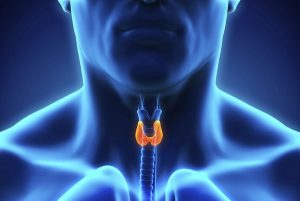Time to Think About Thyroids
With an estimated 20 million Americans affected, thyroid disease is much more common than you might think. People particularly at risk include those who smoke, are pregnant, eat a significant amount of soy food, have been exposed to radiation, have experienced extremely stressful events or have a family history of the disease.
A problematic thyroid, when left undiagnosed, can dramatically increase the risk of heart disease, depression, sexual dysfunction and infertility.
Teresa A. Hubka, DO, an osteopathic obstetrician and gynecologist from Chicago, details the symptoms associated with thyroid disease so you can know the signs and get the immediate treatment you need.
“The thyroid, a butterfly-shaped gland located on the front of the neck, produces thyroid hormones which regulate the body’s metabolism,” explains Dr. Hubka.
“There are two common conditions associated with thyroid diseases: hyperthyroidism (overactive thyroid disease), which speeds up the metabolism when the thyroid glands produce excessive amounts of thyroid hormones; and hypothyroidism (underactive thyroid disease), which slows down the metabolism when the thyroid hormones fall below normal in the bloodstream,” she says. “In both hypothyroidism and hyperthyroidism, the thyroid can become larger than normal, creating a lump under the skin called a goiter.”
Common Symptoms of Thyroid Disease
According to Dr. Hubka, there are some common symptoms associated with each condition:
Hyperthyroidism Symptoms
- Nervousness or irritability
- Increased perspiration and an intolerance to heat
- Insomnia
- A fast heartbeat
- Irregular menstrual periods and muscle weakness
- Weight loss, even when eating more than usual
- Swelling of eye tissue, making the eyes appear to bulge out
- Fuzzy thinking, body pain, fatigue and slow reflexes
Hypothyroidism Symptoms
- Depression
- Sluggishness and muscle weakness
- Weight gain, even when not eating more or exercising less than usual
- Dry or scaly skin
- Hair loss
- Poor memory and difficulty concentrating
Diagnosis and Treatment of Thyroid Disease
“Autoimmune thyroid diseases are more common in young and middle-aged women,” says Dr. Hubka. “And unfortunately, most times, these diseases go undiagnosed.” To diagnose a thyroid disease, your physician will perform a physical examination, review your symptoms, and take blood tests to find out if the thyroid hormones in the blood stream are too high or too low.
Treatments for thyroid disease vary depending on the severity of symptoms. Hypothyroidism is usually treated with thyroid hormone replacement pills, which can restore normal levels of thyroid hormones in the blood. This treatment is relatively simple, but it requires doctor visits once or twice a year for an examination, blood tests and medication adjustments.
Hyperthyroidism is treated with anti-thyroid medications, which block the thyroid’s production of thyroid hormones. There are also more permanent treatments such as:
- Radioactive iodine, which can be taken in capsules or mixed with a glass of water.
- Thyroidectomy, a surgical procedure to remove most of the thyroid gland.
These permanent treatments typically produce an underactive thyroid that will need to be treated with thyroid hormone replacement tablets.
So, what should you learn about thyroid disease? “Pay attention to your body. If there is any significant change in weight or lingering change in emotional status, seek medical treatment from your doctor. Diagnosis is always the first step to getting the proper treatment for thyroid disease,” concludes Dr. Hubka.
If you don’t have a doctor, consider seeing a Doctor of Osteopathic Medicine, or a DO, who will look beyond your symptoms to understand how lifestyle and environmental factors affect your wellbeing. A DO will listen and partner with you to help prevent illness and encourage your body’s natural tendency toward self-healing.
